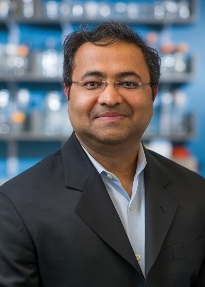 Vishal Vaidya is the recipient of the Society of Toxicology (SOT) 2015 Achievement Award. He has contributed to advancing regulatory science by modernizing toxicology and has set a high standard for future drug development and patient care. Dr. Vaidya has developed, evaluated, and validated highly novel tools for biomarker detection, comparing biomarkers (Kidney Injury Molecule-1 [Kim-1], Fibrinogen, extracellular microRNAs) using preclinical and clinical models of kidney injury in many collaborative studies. His work, supported by a National Institutes of Health/National Institute of Environmental Health Sciences (NIH/NIEHS) Pathway to Independence grant, in collaboration with the Predictive Safety Testing Consortium, led to the first kidney toxicity biomarker (Kidney Injury Molecule-1) qualified by the US Food and Drug Administration (US FDA) and the European Medicines Agency in 2008. These studies are likely to have a very significant impact on the way scientists monitor kidney injury in drug development and also in the clinics. In 2011, Dr. Vaidya won the NIH/NIEHS Outstanding New Environmental Scientist (ONES) award and in 2013 he was selected as one of six North American scientists to receive the Innovation in Regulatory Science Award from the Burroughs-Wellcome Fund.
Vishal Vaidya is the recipient of the Society of Toxicology (SOT) 2015 Achievement Award. He has contributed to advancing regulatory science by modernizing toxicology and has set a high standard for future drug development and patient care. Dr. Vaidya has developed, evaluated, and validated highly novel tools for biomarker detection, comparing biomarkers (Kidney Injury Molecule-1 [Kim-1], Fibrinogen, extracellular microRNAs) using preclinical and clinical models of kidney injury in many collaborative studies. His work, supported by a National Institutes of Health/National Institute of Environmental Health Sciences (NIH/NIEHS) Pathway to Independence grant, in collaboration with the Predictive Safety Testing Consortium, led to the first kidney toxicity biomarker (Kidney Injury Molecule-1) qualified by the US Food and Drug Administration (US FDA) and the European Medicines Agency in 2008. These studies are likely to have a very significant impact on the way scientists monitor kidney injury in drug development and also in the clinics. In 2011, Dr. Vaidya won the NIH/NIEHS Outstanding New Environmental Scientist (ONES) award and in 2013 he was selected as one of six North American scientists to receive the Innovation in Regulatory Science Award from the Burroughs-Wellcome Fund.
Dr. Vaidya received his PhD in Toxicology from the University of Louisiana in 2003 and completed his postdoctoral fellowship in nephrology from Brigham and Women’s Hospital in 2007. As an Assistant professor at Harvard, he has faculty appointments at the Brigham and Women’s Hospital where he directs the Laboratory of Kidney Toxicology and Regeneration; at the Harvard Medical School where he heads the Systems Toxicology program within the Harvard Program in Therapeutic Sciences; at the Harvard School of Public Health where he directs a 5-credit graduate level course on Principles of Toxicology-Molecular and Translational Toxicology every fall; and at the Harvard Clinical and Translational Science Center (Harvard Catalyst) where he directs the course “Understanding Biomarker Science: From Molecules to Images” every spring.
He has been a member of SOT since 1999. In 2001 he received the Novartis Graduate Student Fellowship Award that was presented at the SOT Annual Meeting. Over the years, Dr. Vaidya has received the Comparative and Veterinary Specialty Section Award (2002), Risk Assessment Specialty Section Award (2005), American Scientist of Indian Origin Young Investigator Award (2012), and SOT’s Leading Edge in Basic Science Award (2014). He also has been active within SOT Committees having served on the Career Resource and Development Committee, Continuing Education Committee, and as a councilor for the Northeast Regional Chapter of SOT.
The Society is pleased to present Dr. Vaidya with the 2015 SOT Achievement Award.